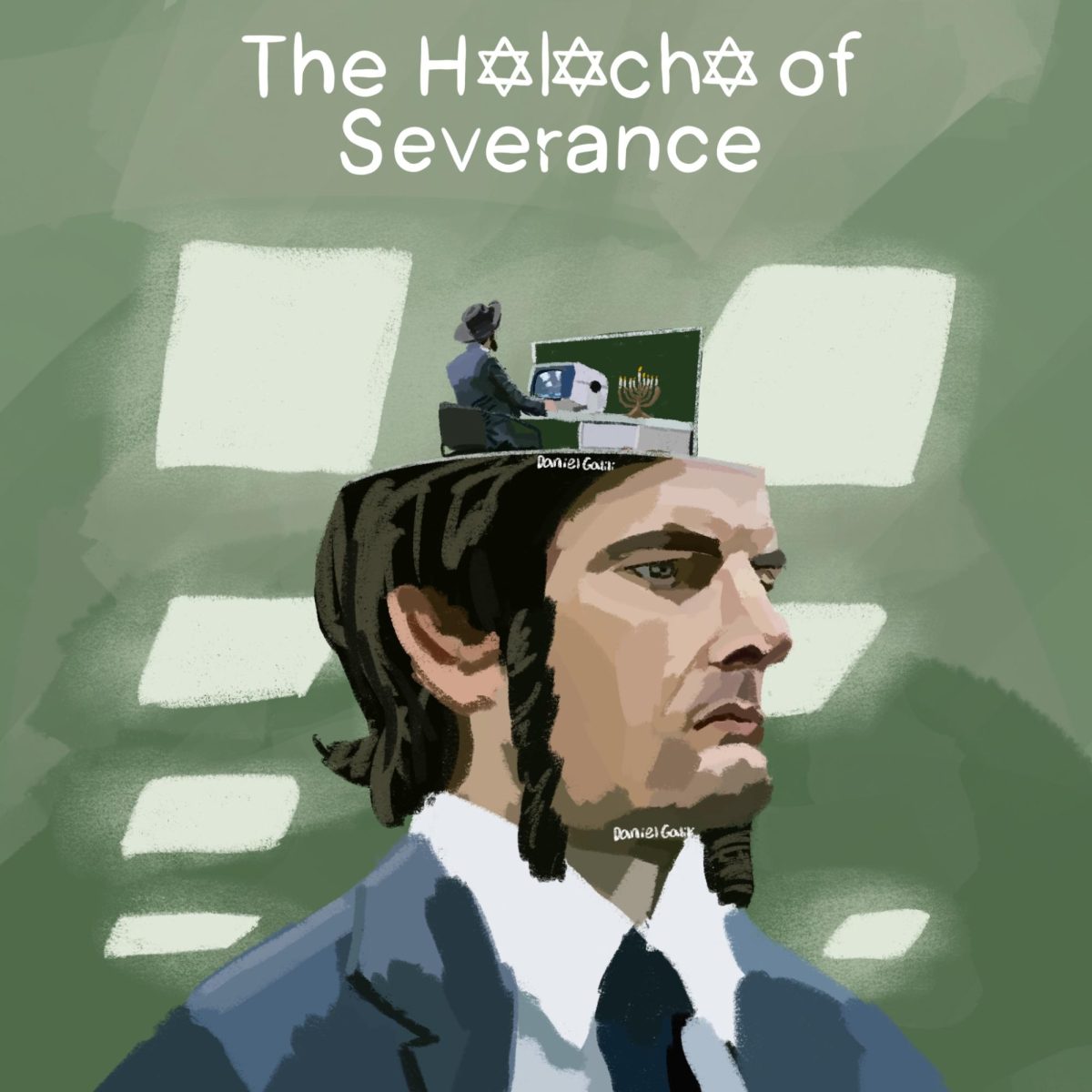As Lumon’s Macro Data Refinement team huddles around the television, there is an air of anticipation. This is the first time that an “innie” in the Severed Wing has been able to get a message to their “outie,” or any message to the outside world at all. Maybe this would finally make a difference, now that an outie knew how bad the conditions were.
Helly R.’s outie speaks from the screen, and everyone’s spirits fall. “Helly, I watched your video asking that I resign… I understand that you’re unhappy with the life that you’ve been given. But you know what? Eventually, we all have to accept reality… I am a person. You are not. I make the decisions. You do not… Your resignation request is denied.“
The show Severance, which premiered on Apple TV in 2022, has gained popularity following the release of its second season in January of 2025. The psychological thriller covers themes of morality, free will and workplace ethics.
Severance follows the employees in the “severed department” of a biotechnology corporation called Lumon. The employees in Lumon’s severed department are given a procedure named “severance” which splits their consciousness and memories into a work self, or “innie,” and a non-work self, or “outie.”
The show’s spike in popularity has triggered much internet discussion of its many themes. However, one perspective that is yet to be explored is one of halacha (Jewish law). If a Jew were to be offered a job in Lumon’s severed department, should they accept? What should they consider?
There are many things that a prospective Jewish Lumon employee would have to consider, such as consent, workplace ethics and playing God.
Halacha and Severance both have a lot to say about free will and consent. Can you give consent for something if, for all intents and purposes, a different person will be experiencing it? To answer this, we first have to determine whether, according to halacha, different personalities inhabiting the same body are considered one person or multiple.
The outies of the show’s main cast argue that they are not just one total person, but that the innies are not even partially people and the outies are the only real personality, while the innies argue that they are their own people and should be able to make their own decisions.
Judaism is more clear. Even if the mind is fragmented, each body only has one neshama (human soul). In fact, this idea is so basic that it is taken for granted by most sources.
We can see the singularity of the soul in Genesis 2:7: “And the Lord God formed man of the dust of the ground, and breathed into his nostrils the breath of life; and man became a living soul.”
In this passage, God “breathes” the breath of life into man’s body, breath of life singular. The mind is part of the body, so it stands to reason that even if the mind fractures it still is one body and one soul breathed into it.
So yes, even if a different personality will be experiencing something, it’s still technically you. However, this brings up a different problem. By consenting for your innie to be resigned to this life, you are consenting for a part of you to receive harm. Not just harm, but a life of only harm. Halachically, this falls under self-harm, which is prohibited.
We can see this in Shulchan Arukh, Choshen Mishpat 427:8: “one has a positive duty to remove and guard oneself of any life-threatening obstacle, as it is said ‘beware and guard your soul.’” This can also be seen in Meseches Shabbos 32a: “one should not stand in a place of danger and say a miracle will occur…”
Along with harming oneself, it is prohibited to harm one’s workers. Of course, the Lumon’s middle and upper management are not Jewish, but instead worship the corporation’s founder, Kier Eagan. However, if they were, they would not be doing well. Halacha has a lot to say when it comes to proper treatment of employees.
From the food served in the vending machines to the “break room,” it seems that everywhere you go in Lumon’s severed wing you’ll see violations of both halachic prohibitions and OSHA’s (Occupational Safety and Health Administration) Laws and Regulations going hand in hand.
The most obvious example is the “break room.” From the name one might assume it is similar to a normal office break room, a place where employees might get to have a break from the office hellscape they have been confined to. In fact, in the show Helly R makes this exact assumption.
Unfortunately for her, but fortunately for an OSHA inspector’s paycheck, this is not the case. It is instead a place where the employees are broken. Straight out of a CIA handbook for Enhanced Interrogation Techniques, severed workers are forced into a room and made to repeat a phrase proclaiming their harm to the world and how thankful they are for the “wizened hands” of Lumon.
It goes without saying that this is mentally harmful. As it is said in Vayikra (Leviticus) 25:43, “You shall not rule over [your workers] ruthlessly, you shall fear your G-d.”
Lumon also does not let its Severed workers quit. They are forced to keep coming to work every day and not allowed to communicate to their outies asking to quit the job. This also goes against halacha, as Rav Nahman says in Bava Metzia 10a:11, “When [a worker] does retract his commitment, he is able to do so.”
There is one final problem. Is it halachically wrong to effectively create a consciousness solely for the purpose of working an office job?
This is a theme that is very heavily explored within the show itself. Why would Lumon create the severance procedure in the first place? Lumon says it’s for the purpose of confidentiality, but there is something more sinister under the surface. If a worker cannot remember their time at the office, they can’t report any wrongdoing.
They can’t talk about the break room where they were mentally broken, they can’t quit, they can’t talk about how bad the snacks are, they can’t sue. Lumon isn’t just creating a consciousness to work an office job, they are creating a consciousness for the purpose of living a life of abuse.
Genesis 1:27 teaches that “So God created Mankind in His own image, in the image of God He created him; male and female He created them.”
Rambam commented on this in his Guide for the Perplexed: “As man’s distinction consists in a property which no other creature on earth possesses, …intellectual perception, in the exercise of which he does not employ his senses, nor move his hand or his foot, this perception has been compared – though only apparently, not in truth – to the Divine perception, which requires no corporeal organ.”
In short, Rambam posits that man is different from the other creatures of the earth because he has the ability for higher level thought divorced from the senses, which was made in the image of divine perception. From this we can surmise that the mind was created in the image of God, and so by creating a new consciousness, Lumon is committing the sin of hubris. They are attempting to put themselves on the same level as God…
This brings to mind the story of Nadav and Avihu, Aaron’s two elder sons, who along with their father and younger brothers were among the first kohanim (the Jewish priesthood, patrilineally descended from Aaron). In Leviticus 10, Nadav and Avihu bring forth a flame onto the mizbeach (altar) that was not commanded by Hashem, and so then a flame comes forth from Hashem and they are killed.
Many rabbis throughout the centuries have wondered what specific sin they were being punished for. There is one interpretation that is most relevant to this article.
Rashi writes, quoting Eruvin 63a, “Rabbi Eleizer said: the sons of Aaron died only because they gave decisions on religious matters in the presence of their teacher, Moses.”
Eruvin 63a goes on to elaborate on more reasons why providing a ruling in front of your teacher is punishable by death. From this we can use the Talmudic principle of kal v’chomer (even more so), which means that if something applies to a less severe case, then it will apply even more so to a more severe case.
So we now know that if providing a ruling in front of your teacher is punishable by death, then even more so creating consciousness in front of God — in other words, exactly what Lumon is doing — would be even worse.
So what can we gather from all of this? There are many lessons that we can learn from the media we consume, and even more from philosophical frameworks like halacha. Using frameworks like halacha to view the media we consume, especially media with themes as strong as Severance’s, can teach us real lessons.
You are one person, and that one person deserves choices. That person has a right to be treated properly in the workplace. You deserve to know that you are real. If there’s one thing that we can gather from all of these themes, it’s that every person deserves to be treated with at least a baseline amount of respect; and though some people may sometimes forget it, that includes you.








